 |
| Walmart in Whitehall |
I tell this story to express a point. In America, we are conditioned to think of social importance as emerging out of population numbers. The more people, the greater the importance. This might be true in a purely political sense, but, it does not capture how we actually think about social importance. What is really important about social importance is perception. For example, in the 17th century, the ideal of female beauty was much different from how it is today. In that period, a curvaceous almost overweight figure was preferred. Rotundity bought social cache. Today, the opposite is true. "Beauty" is not a fixed concept, it changes with what we use to talk about the ideal.
The same is true of population centers. In an ontological sense, a populated place is just a collection of bricks and mortar and streets. It assumes no identity until we start to tell stories about the place. And, here, is where the cities of Allentown, Bethlehem, and Easton begin to take on an important role in our imagination. Growing up, my parents would tell me great stories about the halcyon days of Allentown. When kids would go ice skating down at Union Terrace then then buy a hot dog at Yaccos. The pride of the entire city going to a football match at the ASD stadium. Shopping on Hamilton Blvd. and Hess's. Walking to the fairgrounds and randomly meeting family and friends that stretched back to elementary school.
That was Allentown. It had a character. People talked (and still talk) about the character. Despite my many misgivings about Mr. Molovinsky's ideas, his Romanticized rhetoric about the city is why I still respect him. By contrast, you might ask, what do people say about whitehall? There is a generic 1980s mall there. What historical events happened there? None that I can think of. The place is a three mile strip mall, not much more. Now you might say, yeah, but people live there. People have individual memories in their own home. True, I don't deny that. But, when people don't interact, when they don't share communal institutions, group identities are not created. And, the lack of a group identity ultimately leads to great swaths of this Commonwealth living alienated and isolated consumer driven lives.
Alienation is a hash word, but, its a pretty good description of early 21st century America. It is the America inaugurated by Vonnegut and described in cruel detail by David Foster Wallace. It is an America of the individual consumed by herself, her own needs, and her own entertainment. It is a world, frankly, given over completely to the individual and the ego. It is a world that tends toward the skeptical and the nihilistic.
 |
| G.W.F. Hegel |
It is a world, however, that is not necessarily new or entirely modern. Following Kant's "Copernican Revolution" many early 18th century German philosophers attempted to confront the idea of how to escape nihilism in a world devoid of God and constituted by individual consciousnesses. The most successful of these German philosophers was Hegel. Although his entire philosophical project is incredibly difficult and dense it boils down to a few main points, the most important of which is this: none of us is entirely free to determine everything in our own life, the way in which we perceive the world is colored by the community in which we live. Happiness, freedom, and an escape from nihilism is obtained in living one's life in accordance with the spirit (identity) of the community.
Now, that might sound absolutely un-American, but, I don't think that it needs to be. As an American, we have the right to live where we find a community that corresponds with our internal values. And, we ought to be able to find distinctive communities that to a greater or lessor degree fit who we are. Maybe, that place is Allentown, maybe it isn't. But, for the vast, vast, vast majority of people, that place is not going to be the uniform blandness of the suburbs.
 |
| Roosevelt visits Allentown Speaks to Throngs of Citizens |
Cities need to be given the chance to grow and develop distinct identities because it is only within an identity of place that individuals can also find their own purpose and connectedness. We have tried the suburban model, it doesn't work. Political communities must be more robust---there must be more shared institutions and interactions. Until we overcome this problem of lack of sense of place Pennsylvania (and America) will continue to suffer from an anxiety of purpose and narcism of character. Redeveloping mid-sized urban space would go a long way to solving these types of problems.
No comments:
Post a Comment